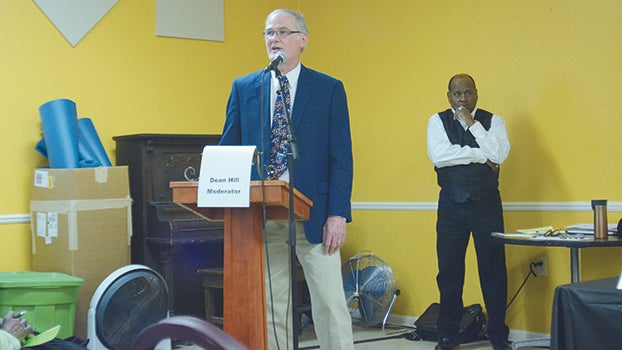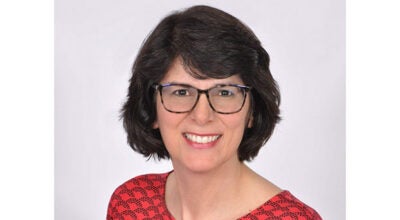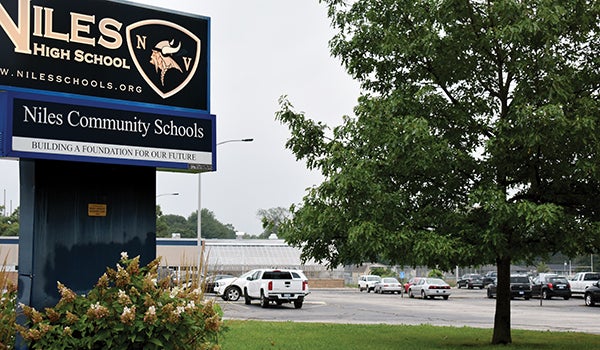Candidates running for sixth congressional district speak during candidate forum
Published 7:40 am Thursday, March 22, 2018

- Moderator Dean Hill helped to lead a forum for 6th District congressional candidates Tuesday night at the Great Niles Senior Center. (Leader photo/KELSEY HAMMON)
NILES — If constituents did not know much about their seven congressional District 6 candidates before, they got the chance to do so Tuesday night during a candidate forum at the Greater Niles Senior Center.
The forum was sponsored by The South County Democratic Club, Berrien County Democratic Party, Berrien County Democratic Women and Harbor Country Progressives.
The candidates, all Democrats, included Aida Gray, Matt Longjohn, David Benac, Rich Eichholz, George Franklin, Paul Clements and Eponine Garrod. Each candidate is running to replace U.S. Rep. Fred Upton (R – St. Joseph) in the November election.
During the forum, moderator Dean Hill asked candidates seven questions, rotating who got to answer first. Each candidate was given 90 seconds to respond.
More than 100 people packed the facility to listen to candidates speak for two hours about a number of hot topic issues, including how to improve representation for minorities, health care, social security, clean energy and many others. Those who attended the forum were also invited to jot down their questions for candidates on a card. Two of the questions were selected to read at the end of the forum, due to time constraints.
Across the board, candidates agreed on a number of key issues discussed, primarily the need to change the makeup of congress.
“We have to resist President Trump’s unfair, unethical and unhinged policies and the only way to do that is to beat congressman Upton in November,” Longjohn said. “We need to be able to provide a sharp contrast and someone who can go toe to toe with Fred.”
The candidates also agreed that the biggest environmental issue shared by the nation and the world is the need to address climate change.
Many of the candidates said they would work to find ways to bring cleaner energy jobs to the region and cut down on use of fossil fuels.
When it came to propositions for fixing the economy, candidates mostly agreed though several had varying ideas for how to address financial problems.
“I’m going to be the millennial here for just a second,” Garrod, 24, said. “First of all, we can legalize it. We can tax it — it being marijuana.”
Garrod also cited the need to increase wages and workers’ rights as well as incentivizing worker co-ops and secondary education, while decreasing the cost of college tuition, to name a few.
Many of the candidates said finding ways to fix the healthcare system would be key to aiding American’s economy.
“Medicare for all,” Benac said. “We start with that and we take the biggest burden off of our economy.”
He said implementing Medicare for all could bring 2.6 million new jobs to the country. In regards to jobs, he touted embracing worker automation and creating new “good jobs” from that.
Longjohn said healthcare would be also be one of his top priorities for improving the economy.
“If we can’t get the cost of healthcare under control … we are handicapped,” Longjohn said. “We are walking around with 20 percent of the economy tied behind our back.”
Additionally, he said helping local farmers by moving away from “big ag” and toward local food production has the potential to improve health and the economy.
Gray said that to address issues with the economy, legislatures would first need to start within the school to assure that youth are receiving access to potential trade school or career training. She also said she wanted to address issues with trading tariffs.
Eichholz said fixing the economy would call for the implementation of more balance between profits and wages. Getting rid of what he referred to as Trump’s “tax scam” was a start.
“For the district, the biggest thing anyone could do is to try to push out from this hole that [Prseident] Trump has put us in with this tax scam,” Eichholz said. “It did not work for Regan and the Democrats dug us out. It did not work for Bush … and now Trump has dug another hole and we have to dig out from there.”
He also said creating a variety of clean energy jobs would help to revitalize the economy and keep jobs in Michigan.
Franklin said re-prioritizing the national budget will be key.
“We need to reevaluate our priorities and re-direct our resources for more productive uses in districts like the 6th Congressional District,” Franklin said.
Clements agreed with many of the candidates and touted the need for improving worker’s rights, health care, agriculture, energy and education.
“Our economy has been a for a long time, for 30 years, has been working for the one percent and not the majority of us,” Clements said. “Getting money out of politics is a critical step, but also to turn that around having a living wage.”
Clements also said he wanted to address issues with incarceration and find ways to reduce recidivism and give those returning to society a shot at finding careers.
A woman in the audience asked candidates if they think immigrants contribute to the country and whether or not “should leave like the president wants them to?”
Gray asked the room to raise their hands if they were Native American. When no one did, she asserted that everyone in the room was an immigrant and that anyone in the country deserves a chance to stay and prosper.
“This is a melting pot,” Garrod said. “Give us your tired, hungry and poor and we will make America really and truly the best country. That is the impetus of what got me politically active.”
Franklin said DACA (Deferred Action for Childhood Arrivals) should stay and become citizens.
“I will never vote for a wall,” Franklin said — referring to the wall that President Donald Trump has prophesized building along the U.S. and Mexican border to keep immigrants out.
All other candidates agreed that protecting immigrants would be a key issue.






